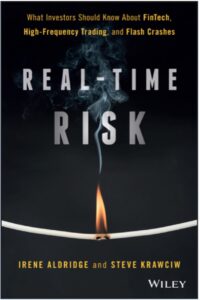Everything changes. Financial Services. Markets. Risk. Technology and innovation transform an entire industry and if you want to survive, you need to change, too. In order to change though, a profound understanding of the new technologies is necessary. PlanetCompliance spoke to Irene Aldridge, the author of the bestseller “Real-Time Risk” about what investors and finance professionals need to know about Fintech and the way Big Data is transforming the world we live in.
There are without doubt not enough women in finance. Not in traditional banking, nor in Fintech. However, that doesn’t mean that there aren’t some extraordinary ones working in the field. Irene Aldridge certainly is one of those.
An American/Canadian businesswoman born in Riga Latvia, Aldridge is the President and Managing Director, Research, of AbleMarkets. Prior to that she has been working in finance for many years and her list of academic achievements contains two PhD programs at Columbia University (ABD) and an MBA from INSEAD. She is also the author of numerous articles on Big Data, HFT and Quant Trading as well as five books. Her latest one, Real-Time Risk sheds light on many aspects of the Fintech revolution.
Why we all need to study Big Data
While the typical reader may be amongst risk officer, the book is actually relevant to a much larger audience as its immediate success shows since it has been a bestseller in financial books right from the start. As Aldridge points out, automation is touching upon every facet of financial services and goes well beyond that. Many functions are subject to lay offs simply because their tasks can be executed by a computer.
With financial services being probably the wealthiest industry, many of the people working in the sector seem to be oblivious of the developments that are taking place. The dramatic transformation, as Aldridge calls it, is not only coming from the automation of the different tasks, but more so from external players like the tech giants Google and Apple that almost secretly make their way into the terrain held by traditional financial institutions. Aldridge points to the brand loyalty of millennials towards tech firms as opposed to conventional banks that are often perceived as evil following the financial crisis. When I asked her about the recommendation for anyone working in these roles, she replied that everyone should study Big Data as it is and will be the driving force of transformation.
More trouble for Hedge Funds
In particular, she foresees dire times for the hedge fund industry, which in her opinion is not embracing change as it should. Existing strategies will not be able to stand up to analysis based on Big Data based models, because they are slower and rely on incomplete information. Many traditional hedge funds though do not invest in technology as they should and seem to think that they get away with despite unsatisfying results. Aldridge puts this down to the fact that it is often hard for people to break their mould and learn something new, especially if they have been doing something for a long time.
Understanding the new sources of data, however, is paramount and without alternative if you want to survive in the industry, according to her.
Her outlook for a different arm of the financial services industry that heavily relies on technology and has recently been under a lot of pressure is less bleak though: High Frequency Traders, which have struggled due to the constant need to shave off microseconds to maintain a competitive advantage and the associated cost of technology, in many cases have successfully made the transition to technology firms deploying their systems for execution of low frequency portfolio management, she said.
A word of advice for Fintech founders
In her book, Aldridge makes a case for investments in Fintech companies. With regard to venture capital, she highlights the model to invest in a large number of firms to offset potential losses by finding the one unicorn. She also pointed to the consequences of accepting venture capital money, which comes with a lot of pressure on start-ups, as VCs often like to get very involved in the operations of their investments. Her advice for founders therefore is to make sure to accept capital only if necessary and, if so, make sure the process with investors is managed effectively. A different route for Regtech firms may be to target the government and its deep pockets. In her view, regulators understand their need to get the right instruments to do their job, so may be very keen to get involved.
Blockchain and Bitcoin
A significant chunk of the book focuses on blockchain technology and applications, which she considers to be very powerful and interesting. Something she is less excited about though is Bitcoin and other cryptocurrencies: Her reasoning is simple, as she is not convinced that it goes beyond basic applications like payment transferring from countries where transfers are restricted as, for example, in Venezuela. With the black markets or shadow banking it provides though there comes a large risk, for instance, in respect of money laundering. She also cited a lack of transparency or the absence of a substantial business case as factors people should be mindful of.
“Real-Time Risk: What Investors Should Know About FinTech, High-Frequency Trading, and Flash Crashes” by Irene Aldridge and Steve Krawciw is published by Wiley. It is available for purchase at the publisher’s website and Amazon.com.


